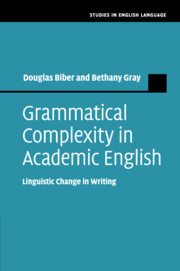Book contents
- Grammatical Complexity in Academic English
- Studies in English Language
- Grammatical Complexity in Academic English
- Copyright page
- Contents
- Figures
- Tables
- 1 Academic writing: Challenging the stereotypes
- 2 Using corpora to analyze grammatical change
- 3 Phrasal versus clausal discourse styles: A synchronic grammatical description of academic writing contrasted with other registers
- 4 The historical evolution of phrasal discourse styles in academic writing
- 5 The functional extension of phrasal grammatical features in academic writing
- 6 The loss of explicitness in academic research writing
- 7 Conclusion
- References
- Book part
- Index
1 - Academic writing: Challenging the stereotypes
Published online by Cambridge University Press: 05 May 2016
- Grammatical Complexity in Academic English
- Studies in English Language
- Grammatical Complexity in Academic English
- Copyright page
- Contents
- Figures
- Tables
- 1 Academic writing: Challenging the stereotypes
- 2 Using corpora to analyze grammatical change
- 3 Phrasal versus clausal discourse styles: A synchronic grammatical description of academic writing contrasted with other registers
- 4 The historical evolution of phrasal discourse styles in academic writing
- 5 The functional extension of phrasal grammatical features in academic writing
- 6 The loss of explicitness in academic research writing
- 7 Conclusion
- References
- Book part
- Index
Summary
- Type
- Chapter
- Information
- Grammatical Complexity in Academic EnglishLinguistic Change in Writing, pp. 1 - 42Publisher: Cambridge University PressPrint publication year: 2016



